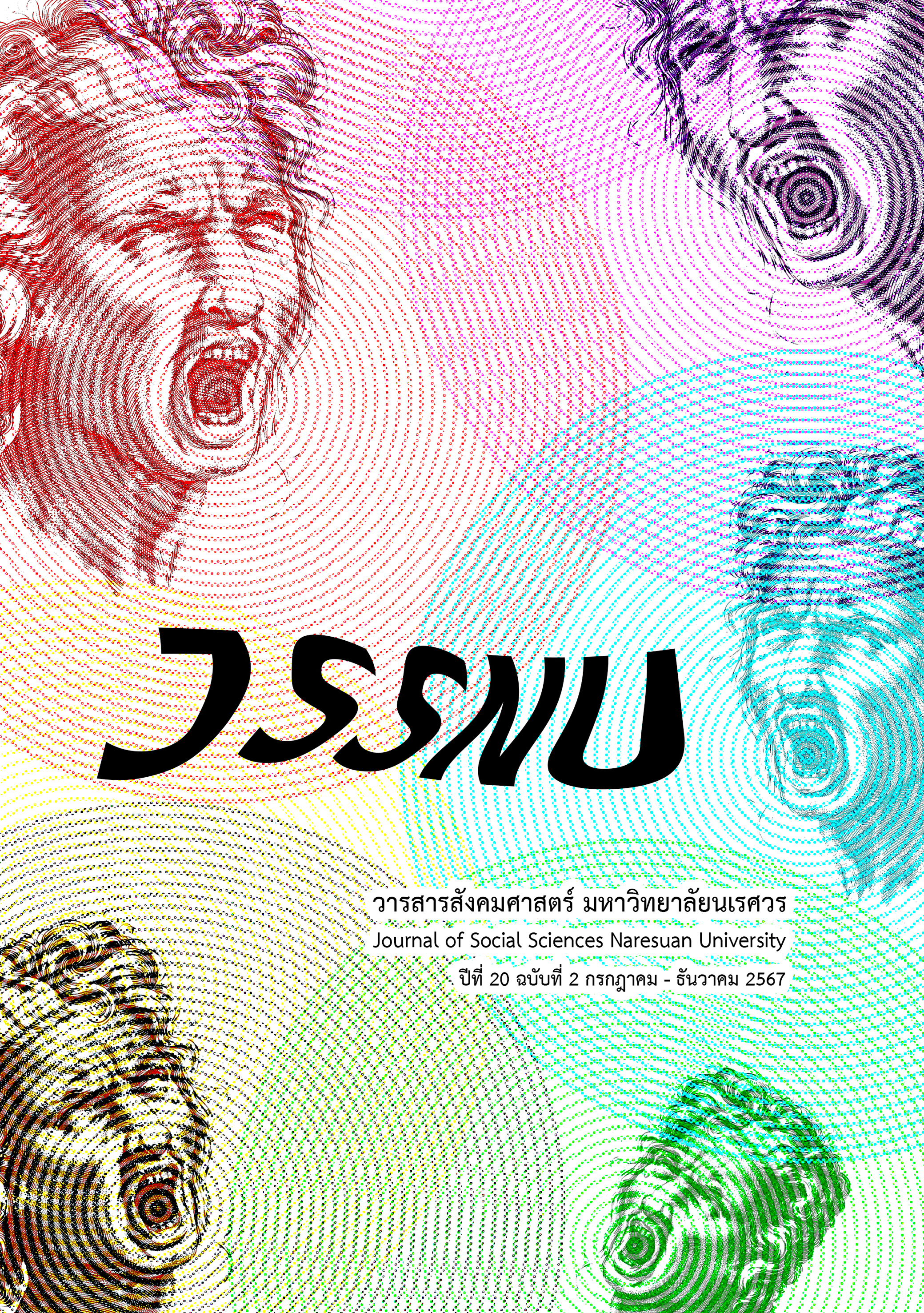First as Tragedy, Then as Farce: History, Class, and Politics in The Eighteenth Brumaire of Louis Bonaparte
Main Article Content
Abstract
Although The Eighteenth Brumaire of Louis Bonaparte is often saluted and considered one of the most important, influential, and cited writings of Karl Marx, it has not been seriously studied, especially when it is compared with Marx’s other celebrated works. Among Thai academics, this work has been mentioned only in passing and it has never been taken seriously. Aiming to fill that gap, this article comprehensively examines The Eighteenth Brumaire by focusing on its background, content, theory, history, and legacy. Challenging major criticisms that this writing is dated, and it is only relevant to those who are interested in the history of France, this article argues that The Eighteenth Brumaire is still relevant to our understanding and critique of capitalism, history, politics, state, and social class in the contemporary context. In addition, this classic writing can help us rethink and reevaluate Marx, whose theories have often been misunderstood and criticized as if they disregarded the question of state, the complex composition of classes in a society, and the uncertainty and irony of historical development.
Downloads
Article Details

This work is licensed under a Creative Commons Attribution-NonCommercial-NoDerivatives 4.0 International License.
References
Carver, T. (2003). Marx’s Eighteenth Brumaire of Louis Bonaparte—Eliding 150 years. Strategies, 16(1), 5-11.
Cowling, M., & Martin, J. (2002). Introduction. In M. Cowling & J. Martin (Eds.), Marx’s Eighteenth Brumaire: (Post)modern interpretations (pp. 1-18). London: Pluto Press.
Engels, F. (1972). Preface to the third German edition. In The Eighteenth Brumaire of Louis Bonaparte, by K. Marx (pp. 8-9). Moscow: Progress Publishers.
Eoseewong, N. (2018, April 2). Ochao lao cham-uat (in Thai). [Ochao tells a farce]. Matichon Online. Retrieved February 27, 2024, from https://www.matichon.co.th/columnists/news_898562
Hayes, P. (1993). Marx’s analysis of the French class structure. Theory and Society, 22(1), 99-123.
Jessop, B. (2002). The political scene and the politics of representation: Periodizing class struggle and the state in the Eighteenth Brumaire. In M. Cowling & J. Martin (Eds.), Marx’s Eighteenth Brumaire: (Post)modern interpretations (pp. 179-194). London: Pluto Press.
Jones, G. S. (2017). Karl Marx: Greatness and illusion. London: Penguin.
Illingworth, J. (2021). The Eighteenth Brumaire of Louis Bonaparte. International Socialist Review, 74. Retrieved from https://isreview.org/issue/74/eighteenth-brumaire-louis-bonaparte/index.html
Macuse, H. (1969). Epilogue to the new German edition of Marx’s 18th Brumaire of Louis Bonaparte. Radical America, 3(4), 55-59.
Marx does historical materialism: The 18th Brumaire of Louis Bonaparte. (2020, November 21). Retrieved February 18, 2024, from https://redletterspp.com/blogs/news/marx-and-the-18th-brumaire
Marx, K. (1972). Preface to the second edition. In The Eighteenth Brumaire of Louis Bonaparte, by K. Marx (pp. 5-7). Moscow: Progress Publishers.
Marx, K. (1977a). Preface to a critique of political economy. In D. McLellan (Ed.), Karl Marx: Selected writings (pp. 388-391). Oxford: Oxford University Press.
Marx, K. (1977b). The class struggle in France. In D. McLellan (Ed.), Karl Marx: Selected writings (pp. 286-297). Oxford: Oxford University Press.
Marx, K. (1977c). The Eighteenth Brumaire of Louis Bonaparte. In D. McLellan (Ed.), Karl Marx: Selected writings (pp. 300-325). Oxford: Oxford University Press.
Marx, K. & Engels, F. (1977). The communist manifesto. In D. McLellan (Ed.), Karl Marx: Selected writings (pp. 245-272). Oxford: Oxford University Press.
McLellan, D. (1973). Karl Marx: His life and thought. New York: Harper & Row.
Myers, J. C. (2003). From stage-ist theories to a theory of the stage: The concept of ideology in Marx’s Eighteenth Brumaire. Strategies, 16(1), 13-21.
1848 French presidential election. (2023). Retrieved February 24, 2024, from https://en.wikipedia.org/wiki/1848_French_presidential_election
1851 French constitutional referendum. (2023). Retrieved February 16, 2024, from https://en.wikipedia.org/wiki/1851_French_constitutional_referendum
Price, R. (2002). Louis-Napoleon Bonaparte: ‘Hero’ or ‘grotesque mediocrity’?” In M. Cowling & J. Martin (Eds.), Marx’s Eighteenth Brumaire: (Post)modern interpretations (pp. 145-162). London: Pluto Press.
Saengkanokkul, P. (2021, September 29). 18 Brumaire/2 thanwakhom 1851 lae 19 kanya 49/22 phruetsapha 57 (in Thai). [18th Brumaire/2 December 1851 and 19 September 2006/22 May 2014]. Retrieved February 27, 2024, from https://progressivemovement.in.th/article/5533/
Sakellaropoulos, S. (2020). Rereading the 18th Brumaire of Louis Bonaparte: The phenomenon of Bonapartism as a capitalist state without popular representation. Journal of Marxism and Interdisciplinary Inquiry, 11(1), 34-47.
Sperber, J. (2014). Karl Marx: A Nineteenth-century life. New York: Liveright.
Stark, S. (2021). The Eighteenth Brumaire of Louis Bonaparte in the United States, Germany, and France, 1852-1932 (Doctoral dissertation). Philadelphia: University of Pennsylvania.
Tejapira, K. (2016). The irony of democratization and the decline of royal hegemony in Thailand. Southeast Asian Studies, 5(2), 219-237.
Tomba, M. (2013). Marx as the historical materialist: Re-reading the Eighteenth Brumaire. Historical Materialism, 21(2), 21-46.
Webb, D. (2002). Here content transcends phrase: The Eighteenth Brumaire as the key to understanding Marx’s critique of utopian socialism. In M. Cowling & J. Martin (Eds.), Marx’s Eighteenth Brumaire: (Post)modern interpretations (pp. 243-257). London: Pluto Press.
Wetherly, P. (2002). Making sense of the ‘relative autonomy’ of the state. In M. Cowling & J. Martin (Eds.), Marx’s Eighteenth Brumaire: (Post)modern interpretations (pp. 195-208). London: Pluto Press.


